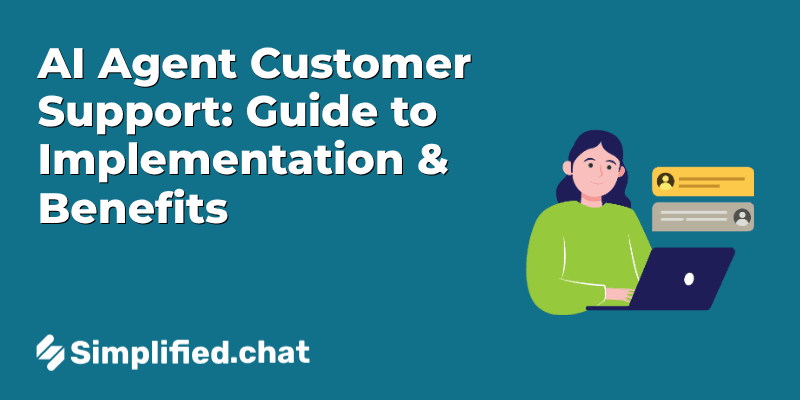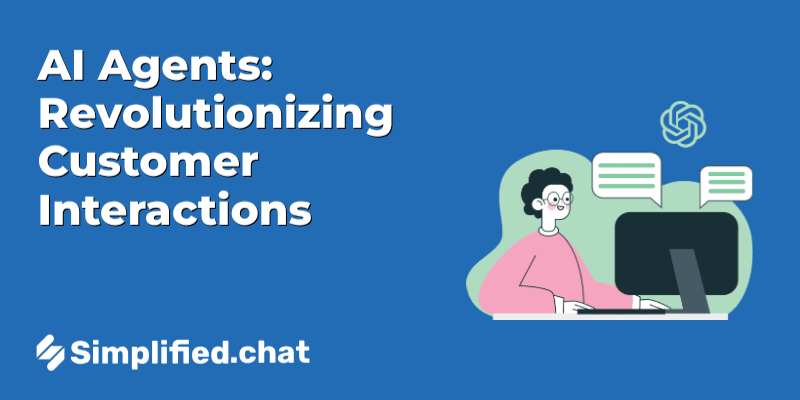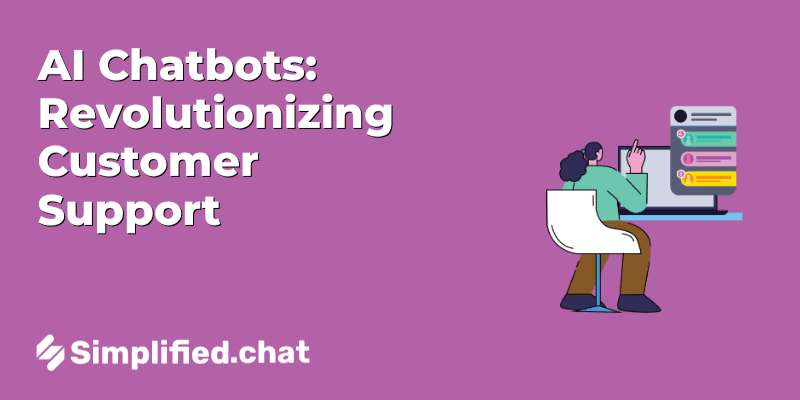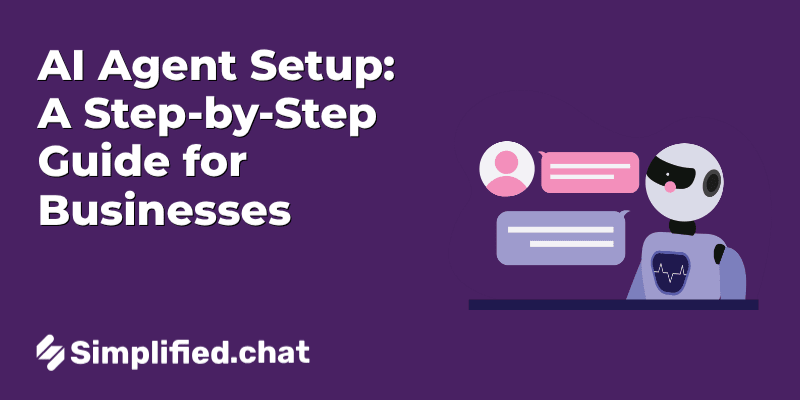Table Of Content
What Are AI Agents for Customer Support and How Can They Benefit Your Business?
AI agents are sophisticated software programs powered by artificial intelligence, designed to automate and enhance customer interactions. They can understand natural language, provide relevant information, and resolve common issues, freeing up your human agents to handle more complex tasks.
According to a recent article from Gartner, "Gartner Predicts Agentic AI Will Autonomously Resolve 80 Percent of Common Customer Service Issues Without Human Intervention by 2029." The article highlights that by 2029, agentic AI is expected to autonomously handle 80% of common customer service issues, leading to a significant 30% reduction in operational costs. This insight is crucial for decision-makers looking to enhance their customer support strategies through AI technology. Read the full article here: Gartner.
Understanding AI Agents in Customer Support

AI agents have become a pivotal component in modern customer support, transforming how businesses engage with their clients. To truly appreciate their impact, it's important to understand what AI agents are, what features they bring to the table, and the tangible benefits they offer to customer service operations.
What are AI Agents?
At their core, AI agents are software programs designed to interact with humans or systems using artificial intelligence. In customer support, they typically take the form of chatbots, virtual assistants, or automated responders capable of understanding and responding to customer inquiries. Unlike simple scripted bots, AI agents leverage natural language processing (NLP) and machine learning to interpret customer requests, deliver accurate responses, and even anticipate needs based on historical data.
For example, an AI agent can guide a user through troubleshooting steps for a product issue or process routine requests such as account status checks, freeing human agents to focus on complex problems.
Key Features of AI Agents
Several characteristics distinguish AI agents from traditional automated tools, making them particularly effective in customer support:
- Natural Language Understanding: AI agents comprehend conversational language, allowing customers to interact naturally rather than using rigid commands.
- Context Awareness: They retain context within a conversation, enabling multi-turn dialogue that feels coherent and personalized.
- 24/7 Availability: Unlike human representatives, AI agents can operate continuously, ensuring support around the clock.
- Integration Capabilities: They can connect with CRM systems, databases, and other platforms to retrieve or update customer information in real time.
- Continuous Learning: Through machine learning, these agents can improve over time by analyzing interactions and adapting their responses.
Benefits of Using AI Agents
Integrating AI agents into customer support brings several practical advantages, many of which directly influence customer satisfaction and operational efficiency:
- Speed and Responsiveness: AI agents can handle multiple inquiries simultaneously without delay, reducing customer wait times significantly.
- Consistency: Customers receive uniform and accurate information, minimizing errors caused by human oversight or fatigue.
- Cost Efficiency: Automating routine interactions lowers staffing needs and allows human agents to focus on higher-value tasks.
- Proactive Support: Advanced AI agents can anticipate issues through data patterns and offer solutions before problems escalate.
- Enhanced Customer Experience: Personalized interactions and immediate assistance contribute to higher satisfaction and loyalty.
Studies have shown that customer support systems incorporating AI agents can improve resolution times and increase customer engagement, underscoring their growing importance in the service landscape. As these technologies evolve, their role is expected to deepen, offering richer, more nuanced support experiences.
Implementing AI Agents: A Step-by-Step Guide

Define Your Customer Support Goals
Before introducing AI agents, it's crucial to clarify what you want to achieve with them. Customer support objectives vary widely, from reducing response times and handling a higher volume of inquiries to enhancing personalization or automating routine tasks. A clear set of goals aligns your AI implementation with real business needs and helps in measuring success afterwards.
Consider questions such as:
- Are you aiming to provide 24/7 support or primarily assist during peak hours?
- Do you want AI to handle simple queries independently, or assist human agents by providing relevant information quickly?
- What metrics will define success for your support team post-implementation (e.g., customer satisfaction, resolution rate, cost savings)?
Identifying these priorities sets the foundation for selecting the right technology and deployment approach.
Choose the Right AI Agent Platform
Not all AI agent platforms offer the same capabilities or ease of integration. When exploring options, pay attention to several factors to ensure the platform suits your business environment:
- Natural Language Understanding: Evaluate how well the AI can comprehend customer queries in your industry-specific language or jargon.
- Customization: Check whether you can tailor the AI’s responses and workflow to reflect your brand voice and customer journey.
- Scalability: Ensure the platform can handle increasing volumes as your business grows without compromising performance.
- Analytics and Reporting: Choose a solution that provides insights into AI interactions to help you refine and optimize your support strategy.
Testing platforms through demos or pilot programs can reveal how intuitive the system is for both customers and support staff.
Integrate AI Agents with Existing Systems
Seamless integration with your current customer support infrastructure is vital. AI agents rarely work in isolation—they need access to your CRM, helpdesk software, knowledge bases, and sometimes inventory or billing systems to provide accurate and timely responses.
Key considerations include:
- Data Synchronization: The AI should access real-time data for up-to-date information, reducing instances of conflicting or outdated answers.
- User Experience: Integration should be smooth enough that customers see the AI as part of your overall support ecosystem, with easy escalation paths to human agents when needed.
- Security and Compliance: Ensure data exchanged between AI agents and your systems complies with privacy regulations and company policies.
- Testing and Monitoring: Before full rollout, conduct thorough testing to catch integration issues, and continuously monitor AI performance to identify opportunities for improvement.
By focusing on thoughtful integration, companies can maintain a consistent support experience while leveraging AI to improve efficiency.
Training Your AI Agents for Success

Data Preparation and Input
Before an AI agent can perform effectively, it needs to be fed well-prepared and relevant data. This stage is critical because the quality of input directly influences how accurately the AI can understand and respond. Effective data preparation involves cleaning, organizing, and sometimes augmenting datasets to ensure they are representative and free of noise or biases.
Consider that even a powerful model will give flawed results if trained on incomplete or skewed data. For example, if customer service AI is trained primarily on data from one demographic, it may struggle to handle inquiries from diverse user groups. Therefore, gathering comprehensive datasets that cover all necessary scenarios is essential for a well-rounded AI agent.
Fine-Tuning AI Responses
Once the foundational training is complete, fine-tuning hones the AI’s ability to deliver precise and contextually appropriate responses. This phase typically involves supervised learning, where the AI’s outputs are compared against expert-validated answers and adjusted accordingly. Fine-tuning can be continuous or periodic depending on the application and new data availability.
An illustrative example is in chatbots designed for technical support. Initial training might equip the bot to address broad issues, but fine-tuning ensures it can navigate industry-specific jargon or handle complex troubleshooting sequences with greater accuracy.
Continuous Monitoring and Improvement
Training does not end once the AI agent is deployed. Continuous monitoring is necessary to track performance metrics like accuracy, speed, and user satisfaction. Modern AI systems benefit from feedback loops where real-world interactions help identify gaps or errors.
By implementing ongoing evaluation, organizations can spot emerging patterns requiring additional training or identify responses that fall short. This allows iterative refinements that keep AI agents effective amid evolving user needs and environments. Some practices include:
- Regularly reviewing conversation logs to detect misunderstandings.
- Updating datasets with fresh examples to maintain relevance.
- Re-training or adjusting model parameters based on performance analytics.
Ultimately, a commitment to continuous improvement helps ensure AI agents remain accurate, reliable, and aligned with the goals they were designed to support.
Optimizing Customer Interactions with AI

Personalizing Customer Experiences
One of the most impactful ways AI transforms customer interactions is through personalization. AI systems analyze customer data—from browsing habits to purchase history—to tailor recommendations and communication. Instead of a one-size-fits-all approach, customers receive responses and offers that feel relevant and timely. For example, chatbots equipped with natural language processing can recall past conversations and preferences, making interactions smoother and more engaging. Personalized experiences significantly increase customer satisfaction and loyalty, driving long-term business value.
Handling Complex Inquiries
AI is increasingly capable of addressing more than simple, transactional questions. Advances in machine learning models allow automated systems to interpret context, sentiment, and even urgency. This means AI can assist customers with intricate problems by guiding them step-by-step through troubleshooting or explaining complicated product details. This relieves pressure on human agents and reduces wait times. Importantly, the system’s capacity to learn from past interactions helps it improve over time, providing more accurate and helpful responses with each engagement.
Escalating Issues to Human Agents
Despite AI’s growing capabilities, some customer concerns require a human touch. Effective AI systems incorporate clear protocols for escalating such cases seamlessly. When AI detects an issue it cannot resolve—due to complexity, emotion, or need for negotiation—it promptly transfers the conversation to a human agent, often providing the agent with context and conversation history. This handoff avoids frustrating customers with repeated explanations and ensures that human expertise complements AI efficiency. The combination improves overall service quality and maintains customer trust.
Measuring the Impact of AI Agents

When integrating AI agents into business processes or customer interactions, it’s crucial to move beyond implementation and objectively measure their effectiveness. Without clear insights into their impact, you risk missing opportunities for optimization or misallocating resources. The process of evaluating AI agents revolves primarily around defining what success looks like, collecting meaningful data, and using those insights to refine your approach continuously.
Key Performance Indicators (KPIs)
To measure the performance of AI agents, start by establishing relevant KPIs tailored to your specific context. These indicators provide quantifiable benchmarks to assess whether the AI is meeting business goals. Common KPIs vary depending on the AI’s role but often include:
- Response accuracy and relevance—to gauge the quality of AI-generated outputs.
- Customer engagement rates—such as session duration or interaction frequency in conversational agents.
- Resolution time—how quickly issues are addressed or processes completed via AI.
- Cost savings—measuring reductions in operational expenses attributed to AI automation.
- Conversion rates—tracking increases in sales or desired actions triggered through AI interventions.
Choosing the right KPIs ensures you measure what truly matters and facilitates more actionable insights.
Analyzing Customer Feedback
Numbers tell part of the story, but understanding user sentiment completes the picture. Customer feedback offers qualitative perspectives on how the AI agent impacts user experience. Collecting this feedback can take various forms:
- Surveys and rating systems immediately following AI interactions.
- Open-ended comments to gather nuanced opinions and suggestions.
- Social listening tools to monitor brand mentions and sentiment online.
Regularly analyzing this feedback helps identify pain points that analytics alone might overlook. For instance, a chatbot might resolve queries quickly (positive KPI) but leave users feeling misunderstood or frustrated (negative sentiment). Integrating both quantitative and qualitative data enables a fuller understanding of AI agent performance.
Refining Your AI Strategy
Measurement is not an endpoint—it’s a stepping stone to improvement. Data-driven insights allow businesses to iterate on AI capabilities and strategy for better outcomes. Consider these steps for refinement:
- Review KPI trends and pinpoint areas lagging expectations.
- Correlate customer feedback with performance metrics to uncover root causes of dissatisfaction.
- Adjust AI training data or algorithms to address identified weaknesses.
- Test modifications through controlled environments before full deployment.
- Establish a regular review cycle to maintain alignment with evolving business objectives and user needs.
This ongoing process helps ensure your AI agents remain effective, relevant, and aligned with your broader goals, turning measurement into meaningful action.
AI Agents for Customer Support: A Practical Guide to Enhancing Service Efficiency
AI agents are changing the way customer support operates by offering faster, more responsive, and reliable assistance. Businesses that incorporate AI agents can decrease operational costs, boost customer satisfaction, and allow human teams to prioritize more challenging tasks. Simplified.chat provides a straightforward platform to create and implement customized AI chatbots suited to your specific business requirements. Begin your journey with Simplified.chat today to see how AI agents can enhance your customer service approach. Visit our website to learn more and start your free trial!
Empower Your Business with Simplified AI Chatbot
Build Your Own AI ChatbotBuild Your First AI Agent Today
Build, train, customize and deploy your first AI chatbot in minutes




